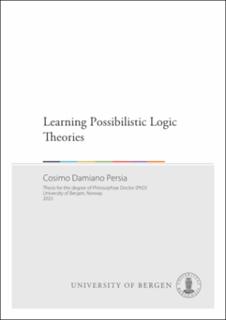| dc.contributor.author | Persia, Cosimo Damiano | |
| dc.date.accessioned | 2023-03-01T12:09:59Z | |
| dc.date.available | 2023-03-01T12:09:59Z | |
| dc.date.issued | 2023-03-15 | |
| dc.date.submitted | 2023-02-16T19:04:55.665Z | |
| dc.identifier | container/13/09/37/f9/130937f9-be9e-4391-8808-b65333f5f4bb | |
| dc.identifier.isbn | 9788230867600 | |
| dc.identifier.isbn | 9788230854259 | |
| dc.identifier.uri | https://hdl.handle.net/11250/3054964 | |
| dc.description.abstract | Vi tar opp problemet med å lære tolkbare maskinlæringsmodeller fra usikker og manglende informasjon. Vi utvikler først en ny dyplæringsarkitektur, RIDDLE: Rule InDuction with Deep LEarning (regelinduksjon med dyp læring), basert på egenskapene til mulighetsteori. Med eksperimentelle resultater og sammenligning med FURIA, en eksisterende moderne metode for regelinduksjon, er RIDDLE en lovende regelinduksjonsalgoritme for å finne regler fra data. Deretter undersøker vi læringsoppgaven formelt ved å identifisere regler med konfidensgrad knyttet til dem i exact learning-modellen. Vi definerer formelt teoretiske rammer og viser forhold som må holde for å garantere at en læringsalgoritme vil identifisere reglene som holder i et domene. Til slutt utvikler vi en algoritme som lærer regler med tilhørende konfidensverdier i exact learning-modellen. Vi foreslår også en teknikk for å simulere spørringer i exact learning-modellen fra data. Eksperimenter viser oppmuntrende resultater for å lære et sett med regler som tilnærmer reglene som er kodet i data. | en_US |
| dc.description.abstract | We address the problem of learning interpretable machine learning models from uncertain and missing information. We first develop a novel deep learning architecture, named RIDDLE (Rule InDuction with Deep LEarning), based on properties of possibility theory. With experimental results and comparison with FURIA, a state of the art method, RIDDLE is a promising rule induction algorithm for finding rules from data. We then formally investigate the learning task of identifying rules with confidence degree associated to them in the exact learning model. We formally define theoretical frameworks and show conditions that must hold to guarantee that a learning algorithm will identify the rules that hold in a domain. Finally, we develop an algorithm that learns rules with associated confidence values in the exact learning model. We also propose a technique to simulate queries in the exact learning model from data. Experiments show encouraging results to learn a set of rules that approximate rules encoded in data. | en_US |
| dc.language.iso | eng | en_US |
| dc.publisher | The University of Bergen | en_US |
| dc.relation.haspart | Paper 1: Persia C, Guimarães R. RIDDLE: Rule Induction with Deep Learning. In: Proceedings of the Northern Lights Deep Learning Workshop 2023, 4. The article is available at: <a href="https://doi.org/10.7557/18.6801" target="blank">https://doi.org/10.7557/18.6801</a> | en_US |
| dc.relation.haspart | Paper 2: Persia C, Ozaki A. On the Learnability of Possibilistic Theories. In: Proceedings of the Twenty-Ninth International Joint Conference on Artificial Intelligence Main track, 2020, 1870-1876. The article is available at: <a href="https://doi.org/10.24963/ijcai.2020/259" target="blank">https://doi.org/10.24963/ijcai.2020/259</a> | en_US |
| dc.relation.haspart | Paper 3: Persia C, Ozaki A. Extracting Rules from Neural Networks with Partial Interpretations. In: Proceedings of the Northern Lights Deep Learning Workshop, 2022, 3. The article is available at: <a href="https://hdl.handle.net/11250/3054947" target="blank">https://hdl.handle.net/11250/3054947</a> | en_US |
| dc.relation.haspart | Paper 4: Persia and A. Ozaki. Extracting Horn theories from neural networks with queries and Counterexamples. | en_US |
| dc.rights | In copyright | |
| dc.rights.uri | http://rightsstatements.org/page/InC/1.0/ | |
| dc.title | Learning Possibilistic Logic Theories | en_US |
| dc.type | Doctoral thesis | en_US |
| dc.date.updated | 2023-02-16T19:04:55.665Z | |
| dc.rights.holder | Copyright the Author. All rights reserved | en_US |
| dc.description.degree | Doktorgradsavhandling | |
| fs.unitcode | 12-12-0 | |
